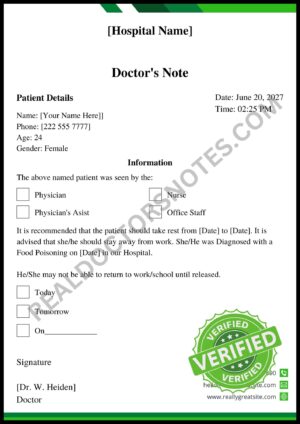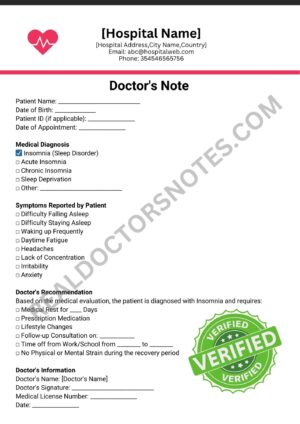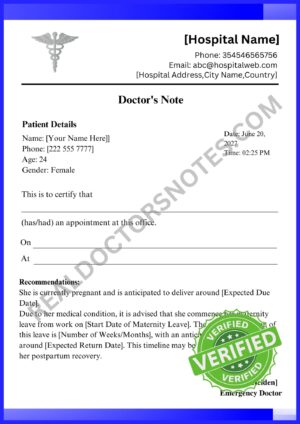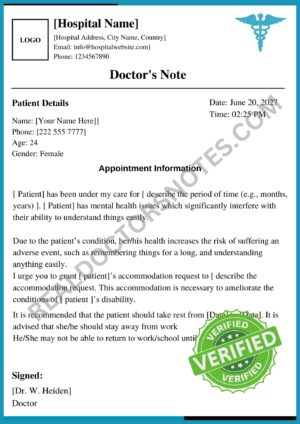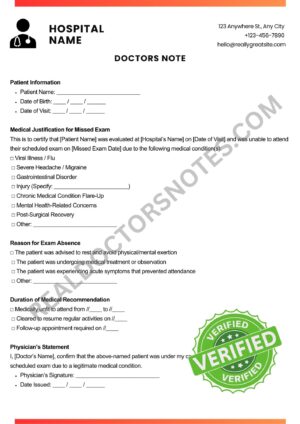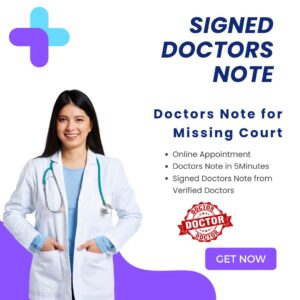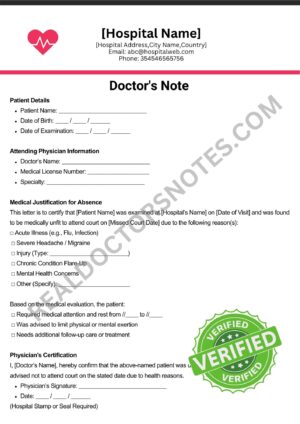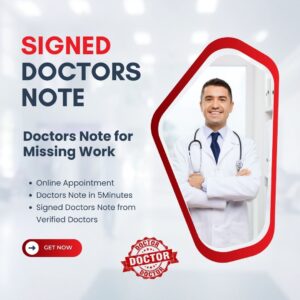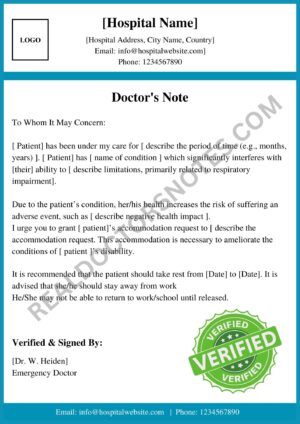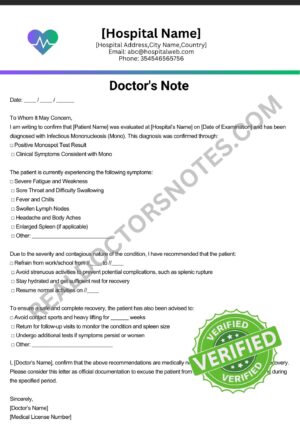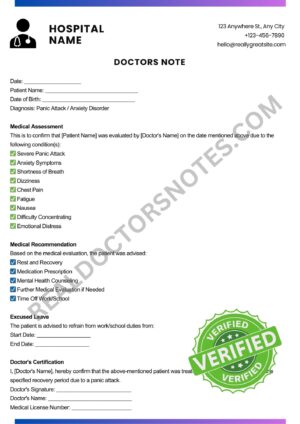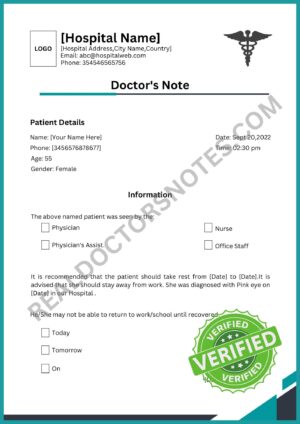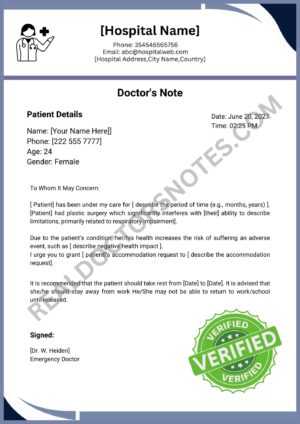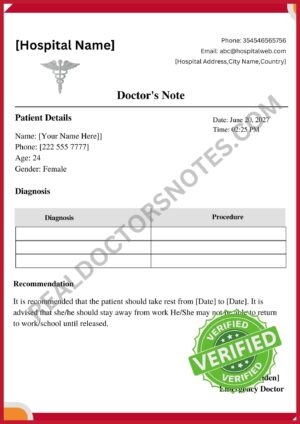Doctors Note
Showing 25–36 of 77 results
Showing 25–36 of 77 results
A doctor’s note is documentation, signed and issued by a registered medical provider, i.e., a physician, therapist, or specialist, to act as official confirmation of medical care attendance, a medical condition, or incapacity to carry out daily duties in school or work. This note is particularly important in justifying and supporting accommodation requests, as well as communication between patients, employers, schools, and relevant organizations.
At its fundamental core, a doctor’s note does contain some fundamental components: the identification of the patient (full name and age, date of birth), the credentials and contact information of the medical professional who provides it, the date the patient was medically assessed, and a brief description of the health-related cause necessitating the time off (or other special considerations). As compared to a general excuse, the note issued by a doctor must be comprehensive and must also be legally and organizationally acceptable and may include a recommended time off as well as restrictions regarding the activities that an individual can engage in, and may even include a reasonable and required time of rest or other accommodations.
In most instances, the guidelines of privacy will prohibit disclosure of medical diagnoses in detail, and thus, the notes would contain generic statements and certify the medical necessity of absence, but not specific details. Most health care providers use such components as the SOAP notes—Subjective, Objective, Assessment, and Plan to maintain effective follow-up care and documentation retention.
What Is a Doctor’s Note for Work?
A doctor’s note for work is an official medical document that a licensed healthcare professional issues to verify that an employee is ill or has another medical condition that is preventing them from going to work. Usually, it is a condition that is asked for at work after a few days’ sick leave, if adjustments or modified work, such as modified duties, are required. These notes must include the following information: employee name, date of physician visit, a statement about whether the employee can work (without including specific diagnosis if sensitive), any work restrictions needed, and/or time away from work needed, and the signature or stamp, and contact information for the physician. It is intended to safeguard workers against discipline for absences, entitlement to sick leave or workplace accommodation, and assist employers in meeting their statutory obligations to provide a safe workplace.
When Do You Need a Doctor’s Note for Work?
Usually, we ask for a work excuse note if an employee is unable to go to work because of being ill, injured, or having a medical appointment, especially when the employee is absent for more than a few working days in a row. Normally,3 days or more of work absence from the office does need a doctor’s note, while some employers may ask for it within 3 days; it completely depends on company policy. In cases of requesting workplace accommodations, when a family emergency occurs, or when available as proof of leave being taken, is also often needed as part of legal compliance, like the Family and Medical Leave Act (FMLA), or other local sick leave legislation. A doctor’s note aids in verifying the authenticity of the leave and safeguards the employee from disciplinary action for unexcused leave.
Medical Doctor Notes will play a big role not only to ensure that absence is medically justified but also to protect the employees and the students from penalties of health-related absence and support insurance claims of the doctor notes, and due to labor or school policies. The Doctor’s Note for Work is used by employers and other authorities to provide legal documentation of official procedures such as sick leave, workplace modifications, altered job roles, and work reclamation once an ailment or injury has taken place.
What Information Should Be Included in a Doctor’s Note?
A doctor’s sickness certificate should provide enough information to professionally and confidentially confirm that an employee is under medical care. Crucial elements are the name of the patient, the date of the medical appointment, and the dates that the employee should be excused from work. The note must also mention if the employee is fit to return or has specific restrictions on his work (without giving diagnosis details) and the doctor’s name, signature, and contact information to verify the letter. Symptom details or short descriptions may be included where necessary, but laws and privacy regulations prohibit employers from seeking any further underlying medical information other than to establish whether or not the need for absence or accommodation is legitimate.
How to Request a Doctor’s Note Online
A doctor’s sickness certificate should provide enough information to professionally and confidentially confirm that an employee is under medical care. Crucial elements are the name of the patient, the date of the medical appointment, and the dates that the employee should be excused from work. The note must also mention if the employee is fit to return or has specific restrictions on his work (without giving diagnosis details) and the doctor’s name, signature, and contact information to verify the letter. Symptom details or short descriptions may be included where necessary, but laws and privacy regulations prohibit employers from seeking any further underlying medical information other than to establish whether or not the need for absence or accommodation is legitimate.
The validity of a real doctor’s note depends on signatures, stamps, and contact details to enable the HR departments and/or schools to authenticate its authenticity. Overall, a physician note can therefore be seen as a means of protecting the rights of the patient, but may also prove to be a functional requirement in a seamless and transparent process of managing health-related leave in the workplace and in educational circles.
Importance of a Doctor’s Note
Doctor’s Note for Work
- Proof of Illness or Injury: It acts as evidence to inform the employer that the worker was really sick.
- Protects employment rights: It helps employees to avoid disciplinary action or loss of income due to unexplained absence.
- Sick leave support policy: Most firms require it as a requirement before they can process or get paid sick leave.
- Limits Transmission in the Workplace: Makes employees more willing to stay home when they are sick and not spread illness to colleagues.
- Makes it Fair: Essentially eliminates any abuse of sick days, as the evidence of such a medical condition is verifiable.
- Medical Recommendations: May comprise suggestions concerning lighter work, working at home, and the time to take off needed due to recovery.
- Legal Compliance: other employers require it as a legal compliance requirement.
Doctor’s Note for School
- Presence Monitoring: Ensures accountability for the absences caused by sickness among the students without causing any punitive action to a student.
- Academic Protection: This provides students with a way to not lose grades or exam opportunities due to medical reasons for absence.
- Facilitates Student Health: It teaches healthy students to rest when sick and stay away at school.
- Back-up School Policy: Notes are required by the school after a certain number of days of absence.
- Prevents Infection of Solicitors: Keeps infected scholars out until it is certified that they do not have it.
- Special Accommodations: Gives suggestions on reduced workload, extra time to work on the assignments, and a limited amount of physical activity (e.g., no sports).
- Parental Trust: Provides parents with official approval of the condition and recovery requirements of the child.
Conclusion
An excuse note from a doctor for work generally serves as formal evidence that an employee’s sick leave, or request for some kind of adjustment of faculties, has been medically approved, while providing the employer with information about what they do and do not need to honour in line with the law and the needs of that employee need. Notes are often appropriate for absences of more than three working days in a row, workplace modifications, or to follow workplace policies and laws, including the Family and Medical Leave Act (FMLA) or the Americans with Disabilities Act (ADA). A note should contain the employee’s name, date of medical assessment, proposed restrictions or time off, and the physician’s signature and contact information, but should not provide a specific medical diagnosis or other medical information that is subject to protection under applicable federal or state law. Using online services, companies give employees access to book a legitimate doctor’s note through telehealth, with privacy and convenience. In short, a legitimate doctor note balances employee rights with employer obligations, simplifying the balance of managing absences and safety in the workplace.
![Real Doctors Note For Work and School [Get in 5 Minutes]](https://realdoctorsnotes.com/wordpress/wp-content/uploads/2025/11/2.png)

